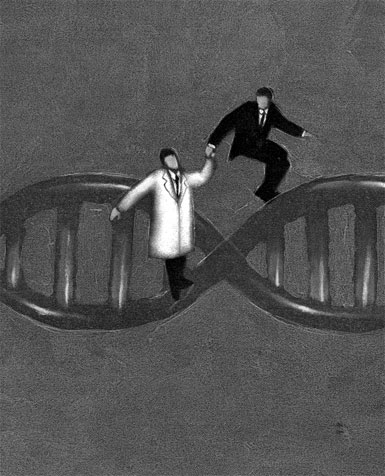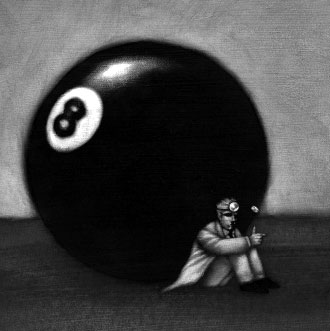A Balancing ACT(G)
By James Wright
The four simple nucleotides—adenine, cytosine, thymine, and guanine (A, C, T, and G)—that make up DNA conceal a world of complexity. Both academe and society will have to deal with that complexity, maintains Dartmouth College's president.

|
All illustrations: Tim Teebken / Artville
The current academic year is an auspicious one for Dartmouth College, for we—as individuals and as an institution —stand on the threshold of a new millennium. But there is an extra measure of importance to this year, one that goes well beyond the artificial construct of the calendar, because 2000 is the year in which the human genome was mapped —at least, in its first draft.
There is no doubt that the conclusion of this phase of the Human Genome Project represents a triumph of modern science and of modern scientific collaboration. By contrast, for most of human history—certainly through World War II—advances in our understanding of the natural and the physical world were most often marked by the lonely experimenter—by an individual making and recording observations, developing and testing hypotheses, doing analyses and calculations—by a Galileo, a Darwin, a Curie, or an Einstein.
But today, science typically involves teams of researchers, and the major scientific achievements of the 20th century have been increasingly collaborative efforts: the Manhattan Project in the 1940s, the Apollo Project in the 1960s, and the Human Genome Project in the 1990s. This development says much about the growing complexity and cost of science, about the need for multidisciplinary approaches, about our ability to process massive amounts of digital information. It also says much about our capacity to collaborate. In the instance of the human genome, there was even an important public-private collaboration—or at least coordination —in the final months of the effort.
I am not a scientist. Others will need to comment on the science and the scientific consequences of this breakthrough. Many people will spend many years sorting out both the biological meaning and the implications of this accomplishment. Yet, although much remains to be explained, the completion of this first phase has a bearing on the business that is always before a university—the business of learning.
It is in the nature of scholarship that answers inevitably lead to more questions—and often to more complicated questions. Albert Einstein insisted that "the important thing is never to stop questioning." The mapping of the human genome marks more of a starting point than a conclusion. It raises complicated questions having to do with matters such as genetic manipulation, with the development of policy, and with the allocation of resources. It forces us to confront issues having to do with acknowledging the assumptions that underlie our definitions of "normal," issues of variation and difference, issues of privacy and con- fidentiality—all of them questions that, ultimately, have to do with who we are and with what we can expect to be.
This scientific breakthrough promises much. But now the difficult work is before us—to use this knowledge to eradicate or ameliorate conditions and maladies that cause misery and suffering. As a society, we must wrestle with vexing issues concerning the role—and the public responsibility—of modern science. How does society assign priority to working on one project over another? What role should the public play in deciding how to allocate our finite resources? And there are many other questions to be faced, including who owns the human genetic code. Already, there are half a million pending patents that would claim proprietorship of various genetic findings.
Beyond the scientific and public policy questions that are involved in the Human Genome Project, it also raises critical ethical issues having to do with privacy—with our ability to protect information about our own genetic structures, about those genomic sequences that may influence our individual health or our physical and emotional development.
This information relates, in turn, to questions about the delivery of medical care and the provision of insurance. Will we all have an equal claim to the medical benefits that will derive from these discoveries? Will there be "haves" and "have nots"? Knowledge about individual genetic codes or mutations may lead to discrimination in employment, in insurance, and in other settings. There is, perhaps, the potential for a new variant on the 19thcentury "survival of the fittest" theories, which sought in an unfortunate way to apply Darwin's findings to society.
It is not clear how best to sort through these matters, but we all have a stake in them, for surely the answers will have an impact on every one of us. The questions we face concerning the human genome are not the singular responsibility of biomedical scientists.

|
|
Knowledge of genetics relates, in turn, to questions about the delivery of medical care and the provision of insurance. Will we all have an equal claim to the medical benefits that will derive from these discoveries? Will there be "haves" and "have nots"? |
Rather, confronting them will require the creative energy of scholars from across the academy, and they may best be answered by those working at the intersections of disciplines. Thus, they relate to the core mission of a liberal education—to the core mission of an institution like Dartmouth. Daniel Coit Gilman, the first president of Johns Hopkins University, hoped that "American universities [would] cherish all branches of learning. . . . Let not," he said, "our love of science diminish our love of letters." Surely, scholars from across the academy have much to offer as we move into this exciting new period in our history.
Finally, this discovery reminds us to recognize and to celebrate the important genetic similarities of all life forms. The human genome map should cause us humans to be a little less arrogant, for fruit flies, flatworms, and yeast cells have much the same chemical makeup as we do! And even more than the basic similarities that cut across all life forms, we need to acknowledge the common molecular structure of all peoples. Four relatively simple nucleic acid bases form the core of every single human being. We each share 99.9 percent of the human genome code—meaning that the genetic makeup of any two persons differs by only one-tenth of one percent.
The map of the human genome has been called our "instruction book" and the "book of life." President Clinton described it as "the language in which God created life." As we think of the marvel of this accomplishment and of the mystery that it has unraveled, however, we must avoid the tendency to believe in genetic determinism. We need to remember that we are each very much more than the sum of our genes. We are all shaped by the many environments through which we pass and by the choices we make in life.
For every individual, our choices and commitments shape the turns our lives take. Our ambitions for ourselves, our values, our generosity of spirit, our capacity to love and to share—these remain our own value-added qualities. This will be true even if we learn that some sequencing of DNA's four nucleic acids influences these choices.

|
|
Confronting these questions will require the creative energy of scholars from across the academy, and they may best be answered by those working at the intersections of disciplines. Thus, they relate to the core mission of an institution like Dartmouth. |
Some of us have been dealt particular advantages in life, while others of us are challenged to overcome disadvantages. Each of us must actively, individually, live our lives and make choices. We are not mechanically following a predestined program. Each of us must insist upon being sustained by our hopes rather than being directed by our fates. Georgia Johnson, a poet of the Harlem Renaissance, wrote:
The right to make my dreams come true
I ask, nay, I demand of life,
Nor shall fate's deadly contraband
Impede my steps, nor countermand.
Sometime in the future, science may well reveal which of us has a greater genetic propensity to excel as a poet, as a caregiver, as a good and loyal friend. I hope not. Human will and human spirit, generosity and creativity, these surely are more than manifestations of biological codes. I believe we are each individuals and not categories defined by color, by gender, or by other external characteristics. Each one of us enriches the world with our unique qualities.
But we humans also depend on each other. Being independent does not have to mean being selfish or being lonely. The Dartmouth community, for example, derives its energy from our individual accomplishments and its identity from our shared values and our capacity to collaborate and to support each other.
Consider the countless individual moments of curiosity, of dissatisfaction with conventional answers, of creative insight that are reflected in the intellectual richness evident everywhere on this campus. And think of the centuries of shared commitment to knowledge and learning—a commitment that ultimately is in service to society at large. Dartmouth depends upon an implicit compact that assures mutual respect and an implicit recognition of how much each of us has yet to learn—and of how much each of us can yet learn.
James Wright is the president of Dartmouth College. A historian, he has been a member of the Dartmouth faculty since 1969. He served as dean of the faculty from 1989 to 1997 and as provost from 1997 until his election to the presidency in 1998. This article is adapted from an address that he delivered at the Convocation that opened the College's 2000-01 academic year.
